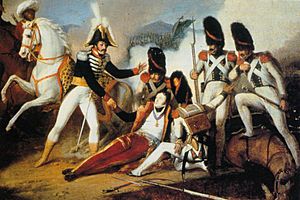Battle of the Panaro facts for kids
Quick facts for kids Battle of the Panaro |
|||||||
|---|---|---|---|---|---|---|---|
| Part of the Neapolitan War | |||||||
 Joachim Murat helps the wounded general Filangieri after the battle. |
|||||||
|
|||||||
| Belligerents | |||||||
| Commanders and leaders | |||||||
|
|||||||
| Strength | |||||||
| 7,000 | 6,600 | ||||||
| Casualties and losses | |||||||
| 409 killed, wounded or captured | 461 killed, wounded or captured | ||||||
The Battle of the Panaro was an important fight during the Neapolitan War in 1815. It happened on April 3, 1815, near Castelfranco Emilia, Italy. In this battle, the army of Joachim Murat, who was the King of Naples, won against a smaller Austrian army. This victory made the Austrians retreat further north.
What Happened Before the Battle?
When the Kingdom of Naples declared war on Austria, the Austrian army wasn't fully ready. Only a small group of about 6,600 soldiers was in position. This group was led by General Frederick Bianchi. They were in the Duchy of Modena, trying to stop the Neapolitan army.
King Murat had a much larger army, about 40,000 men. They had set up their main base in Ancona and were marching north. After a small fight on March 30 near Cesena, General Bianchi's Austrian troops moved back. They took up new defensive positions behind the Panaro River. This allowed Murat's Neapolitan army to capture Bologna on April 2. From Bologna, they got ready to attack the Austrians again.
The Battle Begins
On April 3, the day after taking Bologna, a Neapolitan group tried to cross the Panaro River. This group was led by Michele Carrascosa. They were pushed back from two bridges. But they finally managed to cross the Panaro at Castelfranco Emilia. Then, they quickly charged towards Bianchi's Austrian soldiers.
Heavy fighting continued in the middle of the Austrian lines. King Murat then ordered another group of soldiers to move left. This group was led by General Pietro Colletta. Their job was to push hard on the Austrian right side. The Austrian right side was outnumbered and couldn't hold. General Bianchi had to order his troops to retreat. More Neapolitan soldiers arrived from Bologna. The Austrians then retreated all the way back to their lands behind the Po River. After the battle, Carrascosa and his soldiers quickly took over important towns. These included Modena, Reggio Emilia, and Carpi.
 | William Lucy |
 | Charles Hayes |
 | Cleveland Robinson |

